Dementia Researcher Blogs
The Dementia Researcher Blogs Podcasts - through this show, you can hear our bloggers read their blogs. So if you prefer to read, you can head or our website or you can listen on the move. These shows are about academic / research careers, research, science and life as an early career dementia researchers. Brought to you by https://www.dementiaresearcher.nihr.ac.uk - everything you need, all in one place. Remember to subscribe to our main ‘Dementia Researcher‘ Podcast, here and where ever you get your podcasts.
The Dementia Researcher Blogs Podcasts - through this show, you can hear our bloggers read their blogs. So if you prefer to read, you can head or our website or you can listen on the move. These shows are about academic / research careers, research, science and life as an early career dementia researchers. Brought to you by https://www.dementiaresearcher.nihr.ac.uk - everything you need, all in one place. Remember to subscribe to our main ‘Dementia Researcher‘ Podcast, here and where ever you get your podcasts.
Episodes
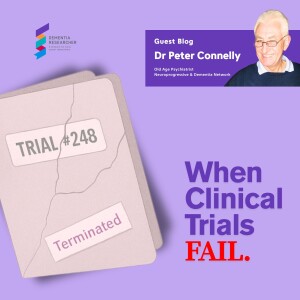
Monday Jun 09, 2025
Dr Peter Connelly - When Clinical Trials Fail
Monday Jun 09, 2025
Monday Jun 09, 2025
Dr Peter Connelly narrates his blog written for Dementia Researcher.
In this blog, Peter examines the emotional, professional, and organisational consequences of failed clinical trials. He reflects on the disappointment felt by both participants and staff, the challenges of managing expectations, and the importance of providing continued support. Drawing on practical insight, he reminds us that while not all trials lead to success, they still contribute valuable experience and learning for future studies.
Find the original text, and narration here on our website.
https://www.dementiaresearcher.nihr.ac.uk/blog-when-clinical-trials-fail/
--
Dr Peter Connelly is a retired Old Age Psychiatrist who spent much of his career in Tayside, helping to establish clinical trials for dementia and neuroprogressive disorders in Scotland. Now working with the Scottish Neuroprogressive and Dementia Network, he combines professional insight with personal experience as a former carer. In retirement, he enjoys music, golf, and time with his grandchildren.
--
Enjoy listening? We're always looking for new bloggers, drop us a line. http://www.dementiaresearcher.nihr.ac.uk
This podcast is brought to you in association with Alzheimer's Association, Alzheimer's Research UK, Alzheimer's Society and Race Against Dementia, who we thank for their ongoing support.
--
Follow us on Social Media:
https://www.instagram.com/dementia_researcher/
https://www.facebook.com/Dementia.Researcher/
https://twitter.com/demrescommunity
https://www.linkedin.com/company/dementia-researcher
https://bsky.app/profile/dementiaresearcher.bsky.social
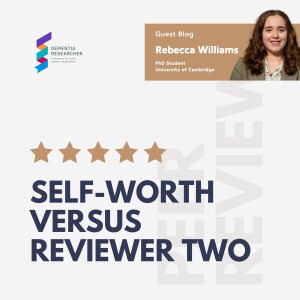
Thursday Jun 05, 2025
Rebecca Williams - Self-Worth versus Reviewer Two
Thursday Jun 05, 2025
Thursday Jun 05, 2025
Rebecca Williams, narrates her blog written for the Dementia Researcher website.
In this blog, Rebecca explores the emotional impact of academic rejection and the difficulty of separating personal worth from professional critique. Drawing on experiences from education through to journal submission, she offers practical ways to cope: allow yourself to react, lean on support, and regain perspective. With honesty and clarity, she encourages researchers not to bury their failures but to share them, learn, and keep moving forward—because one reviewer’s opinion is never the full story.Find the original text, and narration here on our website.https://www.dementiaresearcher.nihr.ac.uk/blog-self-worth-versus-reviewer-two/--
Rebecca Williams is PhD student at the University of Cambridge. Though originally from ‘up North’ in a small town called Leigh, she did her undergraduate and masters at the University of Oxford before defecting to Cambridge for her doctorate researching Frontotemporal dementia and Apathy. She now spends her days collecting data from wonderful volunteers, and coding. Outside work, she plays board games, and is very crafty. @beccasue99
--
Enjoy listening? We're always looking for new bloggers, drop us a line. http://www.dementiaresearcher.nihr.ac.uk
This podcast is brought to you in association with Alzheimer's Association, Alzheimer's Research UK, Alzheimer's Society and Race Against Dementia, who we thank for their ongoing support.
--
Follow us on Social Media:
https://www.instagram.com/dementia_researcher/
https://www.facebook.com/Dementia.Researcher/
https://twitter.com/demrescommunity
https://www.linkedin.com/company/dementia-researcher
https://bsky.app/profile/dementiaresearcher.bsky.social
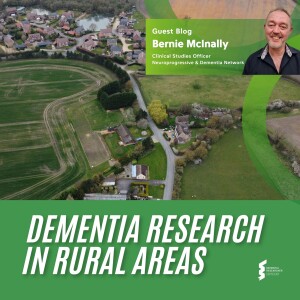
Wednesday Jun 04, 2025
Bernie McInally - Dementia Research in Rural Areas
Wednesday Jun 04, 2025
Wednesday Jun 04, 2025
Bernie McInally narrates his blog written for Dementia Researcher.
In this blog, Bernie reflects on his experience delivering dementia research in the Scottish Borders. Despite common barriers like geography, transport, and limited infrastructure, Bernie describes how community trust, clinical familiarity, and creativity turned challenges into opportunities. He highlights how integrating research into routine care and maintaining personal relationships across rural teams enabled exceptional recruitment results, showing that even dispersed populations can participate successfully in research.
Find the original text, and narration here on our website.
https://www.dementiaresearcher.nihr.ac.uk/blog-dementia-research-in-rural-areas/
--
Bernie McInally is a Clinical Studies Officer at NHS Lothian and the Neuroprogressive and Dementia Network. Bernie's background is in Nursing, working in Mental Health and with Older People. He retired from full time NHS clinical work, and is now back working in Clinical Research supporting delivery of the Enabling Research in Care Homes (ENRICH) Scotland. He is passionate about research delivery, and opening access to people in all communities.
--
Enjoy listening and reading our blogs? We're always on the look out for new contributors, drop us a line and share your own research and careers advice dementiaresearcher@ucl.ac.uk
This podcast is brought to you in association with the NIHR, Alzheimer's Association, Alzheimer's Research UK, Alzheimer's Society and Race Against Dementia, who we thank for their ongoing support.
--
Follow us on Social Media:
https://www.instagram.com/dementia_researcher/
https://www.facebook.com/Dementia.Researcher/
https://twitter.com/demrescommunity
https://www.linkedin.com/company/dementia-researcher
https://bsky.app/profile/dementiaresearcher.bsky.social
Join our community:
https://onelink.to/dementiaresearcher
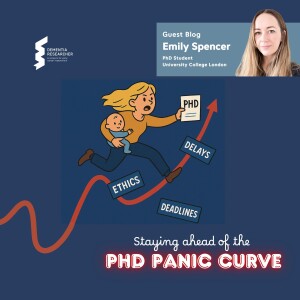
Monday Jun 02, 2025
Emily Spencer - Staying Ahead of the PhD Panic Curve
Monday Jun 02, 2025
Monday Jun 02, 2025
Emily Spencer, narrating her blog written for the Dementia Researcher website.
In this blog Emily reflects on the challenges of staying on track in her doctoral studies while balancing the demands of parenting. With limited funding time remaining, she outlines the steps she’s taking to pre-empt delays, manage ethics approvals, and write speculatively, highlighting the pressure many face to submit within the three-year funding period. Her story is a reminder of the quiet juggling act many researchers perform behind the scenes.
Find the original text, and narration here on our website.
https://www.dementiaresearcher.nihr.ac.uk/blog-staying-ahead-of-the-phd-panic-curve/
#DementiaResearch #AcademicMother #Academia #MaternityLeave #Research #Productivity #PhDWriting #PhDLife
--
Emily Spencer is a PhD Student at University College London looking at improving how GPs communicate with people with dementia and their family carers about their future care. Emily previous had a 5 year career break to pursue a career as a musician, and has previously undertaken research on improving the care people with dementia receive from their GP practice, as well as end-of-life and palliative care provision in the community. Emily is also a new mum and will be writing about her experiences navigating motherhood and a research career.
--
Enjoy listening? We're always looking for new bloggers, drop us a line. http://www.dementiaresearcher.nihr.ac.uk
This podcast is brought to you in association with Alzheimer's Association, Alzheimer's Research UK, Alzheimer's Society and Race Against Dementia, who we thank for their ongoing support.
--
Follow us on Social Media:
https://www.instagram.com/dementia_researcher/
https://www.facebook.com/Dementia.Researcher/
https://x.com/demrescommunity
https://bsky.app/profile/dementiaresearcher.bsky.social
https://www.linkedin.com/company/dementia-researcher
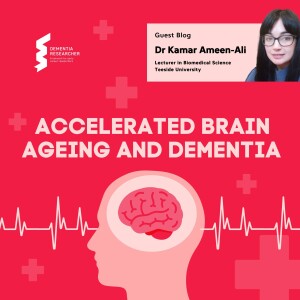
Wednesday May 28, 2025
Dr Kamar Ameen-Ali - Accelerated brain ageing and dementia
Wednesday May 28, 2025
Wednesday May 28, 2025
Dr Kamar Ameen-Ali narrates her blog written for Dementia Researcher.
In this blog, Kam explores whether dementia could be understood as a form of accelerated brain ageing. Drawing on neuropathological evidence and the concept of biological age, she discusses the continuum between normal ageing and neurodegenerative disease, the role of risk and protective factors, and the potential of brain age measurement for early prediction of dementia. The blog also urges caution in relying solely on biomarkers for diagnosis, and argues for a more nuanced understanding of brain health across the lifespan.
Find the original text, and narration here on our website.
https://www.dementiaresearcher.nihr.ac.uk/blog-accelerated-brain-ageing-and-dementia/
--
Dr Kamar Ameen-Ali is a Lecturer in Biomedical Science at Teesside University & Affiliate Researcher at Glasgow University. In addition to teaching, Kamar is exploring how neuroinflammation following traumatic brain injury contributes to the progression of neurodegenerative diseases that lead to dementia. Having first pursued a career as an NHS Psychologist, Kamar went back to University in Durham to look at rodent behavioural tasks to completed her PhD, and then worked as a regional Programme Manager for NC3Rs.
--
Enjoy listening? We're always looking for new bloggers, drop us a line. http://www.dementiaresearcher.nihr.ac.uk
This podcast is brought to you in association with Alzheimer's Association, Alzheimer's Research UK, Alzheimer's Society and Race Against Dementia, who we thank for their ongoing support.
--
Follow us on Social Media:
https://www.instagram.com/dementia_researcher/
https://www.facebook.com/Dementia.Researcher/
https://x.com/demrescommunity
https://bsky.app/profile/dementiaresearcher.bsky.social
https://www.linkedin.com/company/dementia-researcher
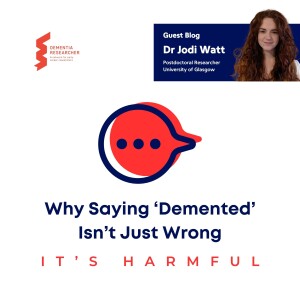
Tuesday May 27, 2025
Dr Jodi Watt - Why Saying ‘Demented’ Isn’t Just Wrong, It’s Harmful
Tuesday May 27, 2025
Tuesday May 27, 2025
Dr Jodi Watt, narrating a new blog they wrote for the Dementia Researcher website.
In this blog, Jodi Watt challenges the continued use of the term ‘demented’ in clinical and research contexts. She unpacks the damaging stereotypes it reinforces, explains the real-world harm it causes, and shows how small shifts in language can promote dignity, agency, and inclusion. Jodi makes a compelling case for adopting person-centred language like “person living with dementia” and urges all of us – especially those in research and healthcare – to think more critically about the words we use. The post includes practical steps, reflections, and a call for collective action to reframe dementia discourse.
Find the original text, and narration here on our website.
https://www.dementiaresearcher.nihr.ac.uk/blog-why-saying-demented-isnt-just-wrong-its-harmful/
--
Dr Jodi Watt is a Postdoctoral Researcher at University of Glasgow. Jodi's academic interests are in both healthy ageing and neurodegenerative diseases of older age, and they are currently working on drug repurposing for dementia. Previously they worked on understanding structural, metabolic and physiological brain changes with age, as measured using magnetic resonance imaging. As a queer and neurodiverse person, Jodi is also incredibly interested in improving diversity and inclusion practices both within and outside of the academic context.
--
Enjoy listening? We're always looking for new bloggers, drop us a line. http://www.dementiaresearcher.nihr.ac.uk
This podcast is brought to you in association with Alzheimer's Association, Alzheimer's Research UK, Alzheimer's Society and Race Against Dementia, who we thank for their ongoing support.
--
Follow us on Social Media:
https://www.instagram.com/dementia_researcher/
https://www.facebook.com/Dementia.Researcher/
https://twitter.com/demrescommunity
https://www.linkedin.com/company/dementia-researcher
https://bsky.app/profile/dementiaresearcher.bsky.social
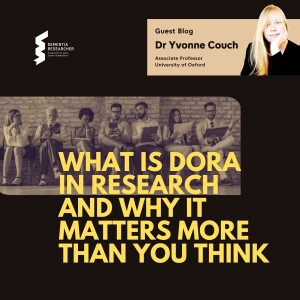
Thursday May 22, 2025
Dr Yvonne Couch - What Is DORA in Research and Why It Matters More Than You Think
Thursday May 22, 2025
Thursday May 22, 2025
Dr Yvonne Couch, narrates her blog written for the Dementia Researcher website.
In this blog, Yvonne shares her belated discovery of DORA—the Declaration on Research Assessment—and reflects on its origins, aims, and ongoing challenges. Through a mix of personal anecdotes, historical context, and pragmatic critique, she explores why DORA matters in research evaluation, and why so many academics still struggle to fully embrace its principles, especially when faced with high-pressure hiring and promotion decisions. A must-read for researchers navigating the complexities of metrics, quality, and career progression.
Find the original text, and narration here on our website.
https://www.dementiaresearcher.nihr.ac.uk/blog-what-is-dora-in-research-and-why-it-matters-more-than-you-think/
--
Dr Yvonne Couch is an Alzheimer's Research UK Fellow and Associate Professor at the University of Oxford. Yvonne studies the role of extracellular vesicles and their role in changing the function of the vasculature after stroke, aiming to discover why the prevalence of dementia after stroke is three times higher than the average. It is her passion for problem solving and love of science that drives her, in advancing our knowledge of disease. Yvonne writes about her work, academic life, and careers as she takes a new road into independent research.
--
Enjoy listening? We're always looking for new bloggers, drop us a line. http://www.dementiaresearcher.nihr.ac.uk
This podcast is brought to you in association with Alzheimer's Association, Alzheimer's Research UK, Alzheimer's Society and Race Against Dementia, who we thank for their ongoing support.
--
Follow us on Social Media:
https://www.instagram.com/dementia_researcher/
https://www.facebook.com/Dementia.Researcher/
https://twitter.com/demrescommunity
https://www.linkedin.com/company/dementia-researcher
https://bsky.app/profile/dementiaresearcher.bsky.social
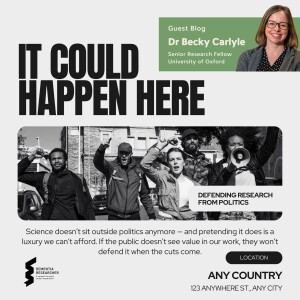
Wednesday May 21, 2025
Dr Becky Carlyle - It Could Happen Here: Defending Research from Politics
Wednesday May 21, 2025
Wednesday May 21, 2025
Dr Becky Carlyle, narrates her blog written for the Dementia Researcher website.
In this timely and personal blog, Becky urges scientists to take a more active role in defending research from political manipulation and public mistrust. Drawing parallels with the US experience, she argues that UK researchers cannot afford to stay apolitical, and must instead engage with their communities, communicate uncertainty clearly, and build coalitions at the local level. From co-designing research with the public to ditching online echo chambers for real-life conversations, Becky sets out practical ways to reconnect and reinforce science’s place in society.
Find the original text, and narration here on our website.https://www.dementiaresearcher.nihr.ac.uk/blog-it-could-happen-here-defending-research-politics/--
Dr Becky Carlyle is an Alzheimer's Research UK Senior Research Fellow at University of Oxford, and has previously worked in the USA. Becky writes about her experiences of starting up a research lab and progressing into a more senior research role. Becky's research uses mass-spectrometry to quantify thousands of proteins in the brains and biofluids of people with dementia. Her lab is working on various projects, including work to compare brain tissue from people with dementia from Alzheimer’s Disease, to tissue from people who have similar levels of Alzheimer’s Disease pathology but no memory problems. Becky is also a mum, she runs, drinks herbal tea's and reads lots of books. Find Becky on LinkedIn
--
Enjoy listening? We're always looking for new bloggers, drop us a line. http://www.dementiaresearcher.nihr.ac.uk
This podcast is brought to you in association with Alzheimer's Association, Alzheimer's Research UK, Alzheimer's Society and Race Against Dementia, who we thank for their ongoing support.
--
Follow us on Social Media:
https://www.instagram.com/dementia_researcher/
https://www.facebook.com/Dementia.Researcher/
https://twitter.com/demrescommunity
https://www.linkedin.com/company/dementia-researcher
https://bsky.app/profile/dementiaresearcher.bsky.social
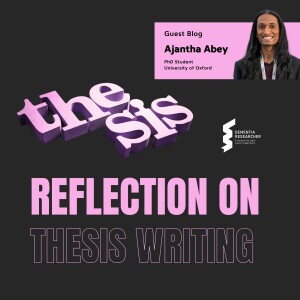
Friday May 16, 2025
Ajantha Abey - Reflections on Thesis Writing
Friday May 16, 2025
Friday May 16, 2025
Ajantha Abey narrates his blog written for Dementia Researcher.
Ajantha reflects honestly on the demanding process of writing a PhD thesis, detailing the unexpected challenges, distractions, and perfectionist pitfalls encountered along the way. From severely underestimating the complexity of making figures, to handling late-stage data reanalysis and navigating life distractions, Ajantha’s account highlights the emotional toll and practical hurdles of thesis completion. The piece offers reassuring insights and valuable tips on productivity, planning, and maintaining balance to help others navigate their thesis journey.
Find the original text, and narration here on our website.
https://www.dementiaresearcher.nihr.ac.uk/blog-reflections-on-thesis-writing/
--
Ajantha Abey is a PhD student in the Kavli Institute at University of Oxford. He is interested in the cellular mechanisms of Alzheimer's, Parkinson's, and other diseases of the ageing brain. Previously, having previoulsy explored neuropathology in dogs with dementia and potential stem cell replacement therapies. He now uses induced pluripotent stem cell derived neurons to try and model selective neuronal vulnerability: the phenomenon where some cells die but others remain resilient to neurodegenerative diseases.
--
Enjoy listening and reading our blogs? We're always on the look out for new contributors, drop us a line and share your own research and careers advice dementiaresearcher@ucl.ac.uk
This podcast is brought to you in association with Alzheimer's Association, Alzheimer's Research UK, Alzheimer's Society and Race Against Dementia, who we thank for their ongoing support.
--
Follow us on Social Media:
https://www.instagram.com/dementia_researcher/
https://www.facebook.com/Dementia.Researcher/
https://twitter.com/demrescommunity
https://www.linkedin.com/company/dementia-researcher
https://bsky.app/profile/dementiaresearcher.bsky.social





